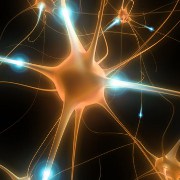 Photo: Getty Images
Photo: Getty Images
Research on the brain is overturning some long-held beliefs and assumptions about the brain's ability to adapt and change its game plan. Let me introduce the amazing neuroplasticity of the brain.
Neurologists at the University of Maryland looked at neuron (nerve cell) activity in the auditory cortex and discovered that the brain is more flexible than any of us realized.
Neurons in the auditory cortex were found to be far more individualistic than expected in their responses to the same input.
Individual neurons can in effect select a response, and shift from their former function to one more favorable to the brain and body. Neurons may even be able to pick and choose which inputs to respond to and which ones to bypass.
This is a different picture from what's found in the visual cortex. Here, neurons work together, performing the same function.
Continued research in this area could lead to advances for prevention and treatment for diseases caused by early brain injury, like epilepsy and cerebral palsy. These findings were published in the January 31, 2011 edition of Nature Neuroscience online.
According to a study by the Mayo Clinic, while our brains stop growing during our twenties, deliberate efforts on our part can keep our brains responding to new learning. It is possible to increase our capacity for memory retention and clarity of thought.
The November, 2009 edition of the Archives of Neurology reported on new research that indicated a correlation between cognitive fitness and muscle fitness. Participants in the top 10 percent of muscle strength also were less prone to cognitive loss. The stronger the individual, the less likely experience of cognitive decline.
Research from the University of Wisconsin performed brain scans on Tibetan monks. Monks who were veterans at meditation had significant activation of brain areas dealing with emotions and attention.
Guy McCormack, clinical professor and chair of the occupational therapy and occupational science department at the MU School of Health Professions has concluded that stroke survivors may be able to regain more of their previous abilities than was thought in the past.
According to the November 19, 2009 online edition of sciencedaily.com, McCormack was studying the neuroplasticity of the brain. He said that neurons change shape and sprout new branches with which to connect to other neurons.
Consequently, the brain can, given time, re-wire itself after a trauma or injury. This differs markedly from what was previously thought, that the brain cannot develop new neurons.
For occupational therapy, this new knowledge is significant. Therapists can help the client build new brain pathways by requiring working the affected body part thus causing the nervous system to adapt.
McCormack advocated allowing more time for patients to recuperate and rehabilitate, so that they have the chance to regain more ground in the healing process.
Resources:
Seeing the brain hear reveals surprises about how sound is processed
http://www.labspaces.net/101751/Seeing_the_brain_hear_reveals_surprises_about_how_sound_is_processed
Brain Fitness should be Alongside All Fitness Protocols
http://www.naturalnews.com/027802_brain_fitness.html
Pushing the Brain to Find New Pathways
http://www.sciencedaily.com/releases/2009/11/091117161118.htm
Neuroprotection and Neurorestoration in Ischemic Stroke: Neuroplasticity and Brain Repair
http://www.medscape.com/viewarticle/726028_5
Reviewed May 23, 2011
Edited by Alison Stanton
Visit Jody's website and blog at http://www.ncubator.ca and http://ncubator.ca/blogger





Add a CommentComments
There are no comments yet. Be the first one and get the conversation started!